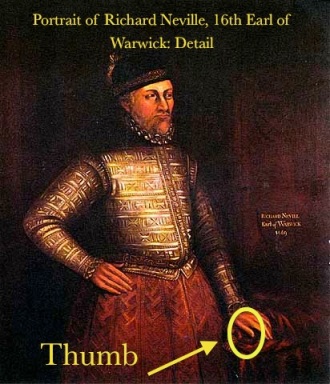Richard III read rumbles onward! Week 4
 [Left: Richard Neville, 16th Earl of Warwick (1428-1471)]
[Left: Richard Neville, 16th Earl of Warwick (1428-1471)]
I was thinking today that even if Mr. Armitage chose not to play Richard III, and, as he once said, might feel the need to play Warwick instead, he’s still extremely qualified for that role.
Look at how elegant Richard Neville’s thumbs are!
Especially in comparison to Richard Plantagenet‘s.
Richard Armitage could be the perfect actor to embody Richard III or Richard Neville.
Come on, sign the petition. You know you want to!
***
Another fun thing to do: Sharon Kay Penman’s very popular blog today asks readers to offer a six-word biography for a historical character.
My personal favorite of hers:
Thomas Becket: “A saint now. I win, Henry.”
and the most amusing one, considering what’s going on at the moment:
Richard III: “Please bury me at York Minster.”
***
Yes, discussions continue about what will happen to those remains if they reliably determined to be those of Richard III — not just where they will rest, but also what the potential economic impact might be. You can catch all the latest news at the King Richard Armitage fan initiative. This week’s summary of news also informs readers about Caroline Devlin’s new play, a one-man show entitled “R-3” and starring Tim Allsop, which is running in London through November 3rd. Dr. John Ashdown-Hill’s review of the play is found here: key line of the review for me, “Even if Richard III’s body has now been dug up in Leicester, in one sense he is still deeply buried.”
***
And now, to the TSIS group read. Directions for participating on Twitter or FB are, as always, found at the end of this post. I’ve been asked, and will provide from here, a summary tying the book to the chronology of the period. If you don’t want the blow-by-blow explanation of plot, just page down to the poll results! Thanks.
—
 [Left: Battlefield at Edgecote Moor. Source.]
[Left: Battlefield at Edgecote Moor. Source.]
Last week: Edward IV and Warwick remained at odds after Edward’s marriage to the dazzling Elizabeth Woodville (TSIS, Bk. 1, ch.8), dashing Warwick’s hopes of a French alliance. Warwick rebelled against Edward after 1464, in alliance with Edward’s brother, George (Clarence), who married Warwick’s daughter, Isabelle (ch. 10). Last week’s chapters concerned Warwick’s first attempt to depose Edward IV, Edward’s captivity in Warwick’s custody (ch. 11) after the Battle of Edgecote Moor (ch. 10), Edward’s subsequent release (ch. 12) with the aid of Richard, then Duke of Gloucester, and Francis Lovell, and the ways that Edward and Elizabeth (ch. 13) and Richard (ch. 14 & 15) dealt with the immediate aftermath of the rebellion and ongoing uprisings. Much of this story was told through the perspective of Francis Lovell or his fictitious diary. Finally, Edward learned that Warwick and George, who had not been disciplined after their rebellion, had allied with his previous enemy, Marguerite d’Anjou, wife of Henry VI, resident of the Tower of London.
This week’s chapters discuss Warwick’s renewed attempt — with French support — to wrest control of England from Edward. Edward learns that John Neville, Warwick’s brother, who had always supported Edward’s family but found the rewards for his loyalty lacking, put his army behind Warwick; Edward and Richard flee to Burgundy (ch. 16). In ch. 17, Warwick’s forces enter London and put Henry back on the throne. Francis Lovell visits a steely Cecily Neville (Richard’s mother), who reveals definite favorites among her children. Shortly thereafter, Elizabeth Woodville, in sanctuary in the Benedictine Abbey at Westminster, is brought to bed with the baby who will be the unfortunate Edward V (the elder of the “missing” princes); we see Elizabeth’s imprudent exuberance through the eyes of Alison (actually Elizabeth) Scrope, his reluctant godmother (ch. 18). Ch. 19 describes preparations at Amboise to marry Warwick’s younger daughter, Anne (Richard’s childhood playmate, sometime betrothed, and future wife) to Henry VI’s son, Edward, and we learn the outcome of George and Isabelle’s marriage. Finally, we glimpse Edward and Richard in Burgundian exile in Bruges (ch. 20), seen partially through the eyes of Rob Percy, Richard’s childhood companion at Middleham, and learn of their prospects to influence Charles “the Bold” of Burgundy to fund an expedition to restore Edward IV to the English throne.
[and — ps. I wanted, during week 2, to mention something important and forgot. In ch. 9, Penman dropped the name of Robert Stillington, Bishop of Bath and Wells. Keep an eye on that name when it shows up again. It’s an important plot point and she puts in there like she’s writing a murder mystery.]
—
 At left, the results of last week’s comic poll. Most people liked Richard’s zinger to Warwick about honor; I picked Edward’s remark to Elizabeth, mostly because I find the image so amusing (“Wanna read while I’m doing you?”). But Penman is great at writing dialogue, and we see that again this week, particularly with the extensive conversation between Edward and Richard in the tavern in Bruges — where we also learn that Richard is a bit of a flirt! Comic poll question regarding that is found at the end of this post.
At left, the results of last week’s comic poll. Most people liked Richard’s zinger to Warwick about honor; I picked Edward’s remark to Elizabeth, mostly because I find the image so amusing (“Wanna read while I’m doing you?”). But Penman is great at writing dialogue, and we see that again this week, particularly with the extensive conversation between Edward and Richard in the tavern in Bruges — where we also learn that Richard is a bit of a flirt! Comic poll question regarding that is found at the end of this post.
One of my questions last week concerned the ongoing picture being drawn of Richard — and I asked about Warwick’s characterization of Richard as an idealist and a moralist. I have never thought that Penman’s narrative offers much evidence for that stance (except and unless Warwick thinks Richard is overly idealistic for supporting his family — in which case the quote is supposed to tell us that Penman’s Warwick is preternaturally Machiavellian). Indeed, I think it’s clearer from this week’s reading that Richard’s notion of honor is very strongly related to family loyalty and the true devotion he feels to his brother, Edward (“Ned”), a tendency entirely true to the period that drawn in strong contrast to his confusion and frustration about why George has been such a disappointment (and not just to Richard and Edward, but also to Cecily). What’s interesting about this, of course, is that Penman’s eventually going to have to explain just how that loyalty erodes sufficiently for Richard to put himself ahead of his nephews’ welfare after Ned’s death — how Richard becomes more like George, I suppose. It’s hard to see this Richard supplanting his nephews for personal gain — although I suppose the seed of tension laid at the end of ch. 15 over the abandoned betrothal to Anne may play a role. I look forward to discovering how Penman will put that narrative together.
Last week, as well, I went nattering on about life stages in the later middle ages and the tension in Penman’s work between portraying the very real political and military responsibilities of Richard and his brothers and fellow nobles, and trying to make him sympathetic to a modern reader in terms of the “teenage” life crises that we could use as a lens for understanding his experiences. This week, we see much more clearly the responsibilities and dangers that a young man (Richard turned eighteen just as he was fleeing England) in this position was subject to — how his every choice involved the judicious attempt to avoid destruction and seek advantage. Aside from the family considerations involved — how do we understand the choices available here and what’s our evaluation of his skill in making them? As Duke of Gloucester, Richard would have had an independent status that he might have maintained in England had he been willing to make nice with Warwick. Is Penman’s depiction of this choice as entirely related to considerations of loyalty to Edward convincing? Or is she trying to have us see him as insufficiently emotionally independent to go that route? Given that he has now served in important political and legal and military positions, how do we read Richard’s reversion to a much more open emotionality — again the adolescent lonely for home and family — in ch. 20? What is its purpose otherwise?
Finally: It’s interesting how this section of the book again offers an extensive comment on the medieval constitution of female power — from the powerlessness of Cecily Neville, trapped in London as her sons fight it out, to the childbed of Elizabeth Woodville to the marriage preparations of Anne Neville and the flirting of the barmaid in the Bruges tavern. Lots of questions here. Under the circumstances, how can Elizabeth be so insistent on her son’s future? Is her sentiment based on the same ground as Cecily’s conviction about Edward? What do we think of the sweet Cecily Neville — who expresses no qualms over the fact that her sons are on different sides of a civil war — now? And do we buy Anne’s hostility to her perspective marriage in the ways that Penman formulates it? Who is powerful here, and how? What makes women powerful?
As usual — just stuff that’s on my mind. What are you thinking as you read these chapters? Feel free to put it in the questions.
Next week, same time, same place, ch. 21-25.
Oh, yeah — and here’s the comic poll as reward for all that cogitation! Thanks for reading.
The Sunne in Splendour Group Read continues on Sunday night at 9 p.m., U.S. East Coast time, and continuing Sunday nights through February.
Directions for veterans of #ArmitageWatch are found here.
Participate via the Institute of Armitage Studies facebook page, here. You can sign up there for a reminder to come and chat on facebook, too.
If you want to sign up for Twitter in order to participate in the chat, but haven’t yet, an explanation of procedures is found at the bottom of this post. The tweetchat “room” for this event will be here.
The chat is free form — come to tweet your impressions, or even a favorite quote from the first five chapters of the book.







Oh Serv, you and your thumbs. 😉 I agree that Warwick’s thumbs are MUCh more attractive. lol
LikeLike
So maybe it wouldn’t be SO terrible if Armitage had to play Warwick …
LikeLike
[…] Last week: We were embroiled in Warwick’s second attempt to wrest control of England from Edward, with the defection of John Neville from Edward‘s camp to Warwick‘s and the flight of the royal brothers to Burgundy (TSIS, Book I, ch. 16). We witnessed various reactions to the readeption of Henry VI (ch. 17) and to the birth of the future Edward V (ch. 18) as well as hearing discussions that took place before the marriage of Anne Neville and Edward of Lancaster (ch. 19) during Edward and Richard’s Burgundian exile (ch. 20). […]
LikeLike
The Armitage / Richard III rumble, Week 5! « Me + Richard Armitage said this on October 29, 2012 at 1:07 am |